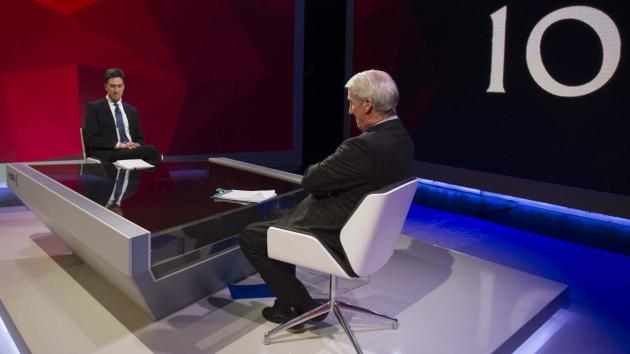As I embarked on the lengthy journey home after the first
leaders’ non-debate, I found myself wondering what preparation David Cameron had
done for his interview with Jeremy Paxman. Ed Miliband, the Labour leader, got
a duffing up from one of his senior advisers and it showed; he was ready to
fight Paxman’s fire with fire. But Cameron seemed genuinely shocked at the
ferocity of Paxman’s questions.
There was no gentle introduction, no warm-up; the former
Newsnight host went straight for the Prime Minister’s jugular, as everyone
surely knew he would, especially when he only had a miserly 18 minutes to
skewer his meat. Cameron couldn’t answer questions on the numbers of food
banks, floundered on zero hour contracts and struggled on government borrowing.
Even being a friend of Jeremy Clarkson and Andy Coulson came under attack. Cameron’s
eyes and tight lips betrayed his nervousness. Whatever preparation had been
done, clearly wasn’t enough.
The Tory leader did rescue it a bit as the interview went
on; relaxing a little – though never hugely – and he managed to get his lines
across on the size of the deficit inherited from the last Labour government,
boasted about the coalition’s economic achievements and outlined a few cuts
planned for the next parliament, such as unemployment benefit being frozen for
two years.
He also still insisted that, if he were still prime
minister after the general election, he would serve every day of a second term
before standing down. Everyone knows this is impossible; it’s a ridiculous
pretence to maintain.
It was striking how Cameron looked when the programme
restarted after the adverts (why weren’t these scrapped?) when he was faced
with questions from the audience. An enormous weight seemed to have been lifted
off his back; the prime minister’s face filled with blood once more, he smiled,
he charmed. The TV ad man was back.
Ed Miliband had an advantage going second ( I understand
the order was decided by the toss of a coin rather than a cunning bit of
political chicanery) as it gave him the opportunity to mentally prepare for
Paxman and maybe he was cheered to see his opponent squirm. But Miliband faced much
sterner questions from the audience than Cameron had faced: ‘Why are you so grumpy?’; ‘Wouldn’t your
brother be better?’. Nevertheless, Miliband just about survived and even got
the first applause of the evening: noticeably Cameron didn’t get any applause
though this could well be that those who had gathered relaxed more as the
programme went on.
Kay Burley was the circus master for this section but whereas
she asked whether the Prime Minister ever had three Shredded Wheat, she
whimpered ‘your poor mum’ to Miliband after a question about his brother.
The surprise was when Miliband was confronted by Paxman;
he was strikingly more combative than the prime minister, answered back and
even mocked the great interrogator: ‘You’re important Jeremy, but not that
important’. There was an odd section where Miliband tried to be macho: ‘Am I
tough enough? Hell yes’, sounding less like the mean Dirty Harry and more as threatening as Monty Python’s Black
Knight after his limbs had been sliced off.
The Labour leader struggled a bit when Paxman, who clearly relished a return to action after a long lay-off,
asked him
to provide a maximum population size for the country; an absurd line of
questioning which both must have known but it will allow some to claim Miliband
wants no limit on immigration.
Personally, I found the questions about the relationship with
his brother just a bit too personal; ‘it was a bruising contest’, the younger
Miliband said, betraying the pain that still clearly exists in the family. And,
much like Cameron, how a future Labour government plans to cut the deficit
remains something of a mystery. Removing TV licences from rich pensioners just
doesn’t cut the mustard.
The snap poll giving Cameron a win genuinely surprised
the press in the spin room; everyone there had witnessed the PM being mauled
and seen Miliband get the only applause of the evening and the biggest laughs
(both at him and with him). Even Nigel Farage, stalking into the spin room
early in the evening, said the Labour leader ‘walked it’, with Cameron ‘nervous
and defensive’.
The poll verdicts will help Tory spinners paint a
positive gloss on the evening’s affair. In truth, expectations were so low for
Miliband, the instant polls show a big rise in his personal ratings in comparison
with normal opinion polls even if he were left slightly behind. Labour spinners
were cheery and bullish; the message ‘this is the reason why David Cameron didn’t
want to be in the same room debating with Ed Miliband’ was repeated ad nauseam.
Will it have changed any votes? Probably an insignificant
few but Labour will be the most cheered; their man gave a good show and put a
spring in the step of foot soldiers as they officially launch their election
campaign today.


